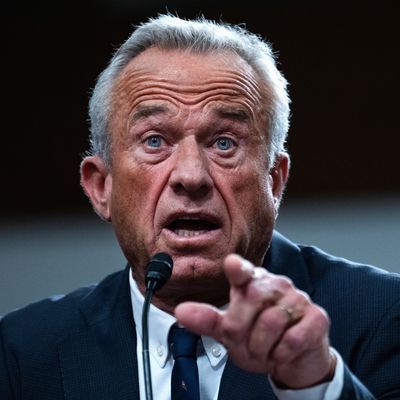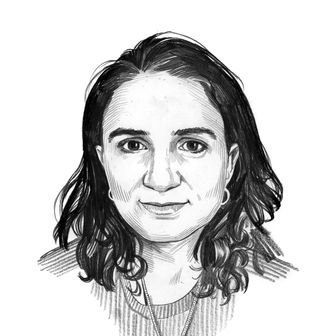
The Senate confirmation hearings for noted conspiracy theorist and dead-animal enthusiast Robert F. Kennedy Jr. have finally drawn to a close. Over the course of two grueling days, the Senate Finance Committee and the Senate Health, Education, and Labor Committee relentlessly grilled Kennedy regarding his stance on various health issues while a motley crew of wellness influencers, baseball-cap-wearing “MAHA Moms,” and his flawlessly Botoxed wife, Cheryl Hines, watched from the gallery.
There were a handful of emotional moments, including a tearful personal story from Senator Maggie Hassan of New Hampshire, as well as more than a few egregious blunders on Kennedy’s part, from his apparent conflation of Medicaid with Medicare (programs he’d oversee if confirmed) to the admission that, yeah, he “probably” did say that he thinks Lyme disease is a military bioweapon. There was also, as to be expected from the Republicans during Trump nominee hearings, a fair amount of sucking up. “you look great for your age,” Senator Markwayne Mullin gushed before ranting about how he believes vaccines may cause autism.
Above all else, the hearings provided a preview of what the American health-care system might look like if he is confirmed as HHS head. Below, a guide to the bleak vision for Making America Healthy Again that Kennedy spelled out in his answers to the Senate committees.
What is RFK Jr.’s stance on abortion pills?
Kennedy has famously vacillated on abortion, insisting for years that he was pro-choice before flip-flopping last year during his presidential campaign. In the hearings, he stated repeatedly that he considers every abortion a “tragedy.”
“I agree with [Trump] that we cannot be a moral nation if we have 1.2 million abortions a year,” he said. “I agree with him that the states should control abortion.”
Key to Kennedy’s abortion agenda is his stance on mifepristone, a medication that allows women to terminate pregnancies in the privacy of their own homes, making it the target of anti-choice activists. Though mifepristone has repeatedly been proven safer and more effective than penicillin or Tylenol, Kennedy intends to investigate any potential “issues” caused by the medication. “President Trump has made it clear to me one of the things he has not taken a position yet on is mifepristone, but he wants me to look at safety issues,” he said. “I will ask NIH and FDA to do that.”
Tellingly, Kennedy dodged specific questions about whether or not he intended to ban or restrict access to mifepristone. “President Trump has not chosen a policy. And I will implement his policy,” he responded to Senator Tammy Baldwin’s pointed questions about whether he would, as head of HHS, continue to allow women to access the medication.
Where does he stand on gender-affirming care for trans people?
Access to gender-affirming care, particularly for minors, has long been a political lightning rod. Senator Josh Hawley interrogated Kennedy about what, precisely, his stance on this issue was, asking whether he would rescind a Biden administration policy he misleadingly said requires “every pediatrician in the U.S.” to perform surgeries on minors. Though the Biden administration petitioned the Supreme Court in opposition to bans on gender-affirming care for minors, there is no rule that “every pediatrician in the U.S.” must perform such surgeries on minors, and the vast majority of trans kids do not undergo any surgical intervention as minors at all.
Kennedy enthusiastically responded that he would rescind such a policy. “By the way, that rule is anti science. The most thorough review on gender-affirming care reports really catastrophic impacts on children. That is science,” he inaccurately stated. He compared minors receiving gender-affirming care — which, again, very rarely includes surgical intervention — to letting children “drink or drive an automobile because they have bad judgment. They are flooded with hormones. Their brains are still in formation.”
Kennedy also said that while “people who do have gender differences should be respected and loved, sometimes love means saying ‘no’ to people.” He added that the American public should also be open to the opinions of medical professionals who view gender-affirming care as an “atrocity.” “They need to be listened to, too. We need to embrace diversity and not force people to do things against their conscience,” he said.
What about weight-loss drugs?
Kennedy has previously stated his opposition to GLP-1 drugs like Wegovy and Ozempic, telling Fox News’s Greg Gutfeld that Ozempic’s manufacturer Novo Nordisk was “counting on selling it to Americans because we are so stupid and so addicted to drugs.” He took a softer tack when Senator Andrew Kim asked if he supported GLP-1 medications, saying they are “miracle drugs” that should be prescribed to people with morbid obesity and diabetes.
However, Kennedy added, “I do not think they should be the first front line intervention for 6-year-old kids, for whom they are currently — that is the standard of practice now.” This is patently false: None of the GLP-1 medications are currently approved for use in the United States for kids 12 or younger. He also added that he did not believe drugs like Ozempic should be prescribed without “prescriptions for exercise,” because “otherwise they eat away at muscle and are counterproductive.” (It is standard practice for physicians to recommend exercise and a healthy diet alongside medications like Ozempic.)
And psychotropic medications?
SSRIs, or selective serotonin reuptake inhibitors, have been on the market for decades and are currently prescribed to millions of Americans. In combination with other interventions, such as talk therapy and exercise, they are considered to be safe and effective for treating depression and anxiety. But Kennedy used a question from Senator Tina Smith as an opportunity to promote conspiracy theories about SSRIs being linked to school shootings, telling her that there is “no science” to conclude antidepressants do not cause violence — a blatant falsehood that has been debunked by numerous studies. He later alluded to this theory again, telling Kim in response to a question about gun violence that he believes “we need to study all the causes of mass shootings. All the causes.”
Kennedy also took aim at drugs like Adderall, telling Senator Tommy Tuberville that “there is clearly a major problem with overprescription with our entire population.” Kennedy cited a statistic saying that prescription drugs like Adderall are the third-leading cause of death in the United States — a shockingly disingenuous claim considering many of these fatalities are attributable to drugs like opioids and benzodiazepines, not commonly prescribed medications like antidepressants or stimulants like Adderall.
What stance did RFK Jr. take on vaccines?
Most of the senators’ questions focused on Kennedy’s position on vaccines, and with good reason. Kennedy is one of the most prominent anti-vaccine voices in the world, has penned multiple books on the subject of vaccine safety, questioned whether childhood vaccines cause autism, and petitioned the United States government to revoke emergency access to the COVID vaccine at the height of the pandemic.
Throughout the hearings, Kennedy repeatedly stated that he is “pro-vaccine” and that he vaccinated his own children against childhood diseases. Yet when asked about specific critical comments he had made in the past, he repeatedly doubled down or feigned ignorance. When asked by Senator Bernie Sanders if the COVID vaccine saved millions of lives, Kennedy said he didn’t know as “we don’t have a good surveillance system” to track its effects. And when grilled by Senator Raphael Warnock about remarks he had made comparing the CDC’s promotion of vaccines to the Catholic Church covering up its pedophilia scandal, Kennedy first denied making such a statement, then backtracked: “There is nothing I am going to do to harm the CDC. I want to make sure our science is gold-standard science.”
Kennedy did offer a few clear answers to pointed questions regarding whether he would ban or curtail access to specific vaccines. When Senator Patty Murray asked if he would recommend parents vaccinate their children against measles, he responded that he would; when Senator Bill Cassidy asked if he would promise to instruct the FDA not to “deprioritize or delay review of new vaccines or historical vaccine standards,” Kennedy also replied in the affirmative.
Yet when asked repeatedly about perhaps the most damning moment of his career — his 2019 visit to Samoa after the government banned the MMR vaccine, leading to a measles outbreak that killed 83 people — Kennedy refused to assume any responsibility and denied that the disease itself can be deadly.
“I went there to make health care much more efficient. I never gave a public statement about vaccines,” Kennedy claimed. This is false: As Senator Ed Markey pointed out, the trip was arranged by a local anti-vaccine activist, and he met with the Samoan officials while there to discuss vaccinations. “You will not find a single Samoan who said, ‘I did not get a vaccine because of Bobby Kennedy,’” he added.
Kennedy’s lack of consistency regarding his views on vaccines prompted outrage among some senators, particularly Maggie Hassan of New Hampshire, who ferociously rebutted her Republican colleagues’ accusations of partisanship and failing to “question” science by invoking her own experience as the parent of a 36-year-old with severe cerebral palsy.
“Like every mother, I worried about whether in fact the vaccine had done something to my son,” Hassan said through tears, citing a now-retracted 1999 study that claimed that MMR vaccines can cause autism. “But sometimes science is wrong. We make progress. We build on the work. We become more successful.” Directing her comments to Kennedy, Hassan said, “When you continue to sow doubt about settled science, it makes it impossible for us to move forward. So that is what the problem is here. It’s the rehashing and relitigation that we can’t move forward and it keeps us in place.”
This was, above all else, the takeaway from the confirmation hearings: Appointing Robert F. Kennedy, Jr. as the highest authority on public health in the United States would ensure that science would not move forward. In fact, it would almost certainly guarantee that everyone, from women seeking reproductive health care to those struggling with depression and anxiety to gender-nonconforming youth to vulnerable newborns, would move at least a few steps back — and the country, as a whole, would become a little less healthy.


